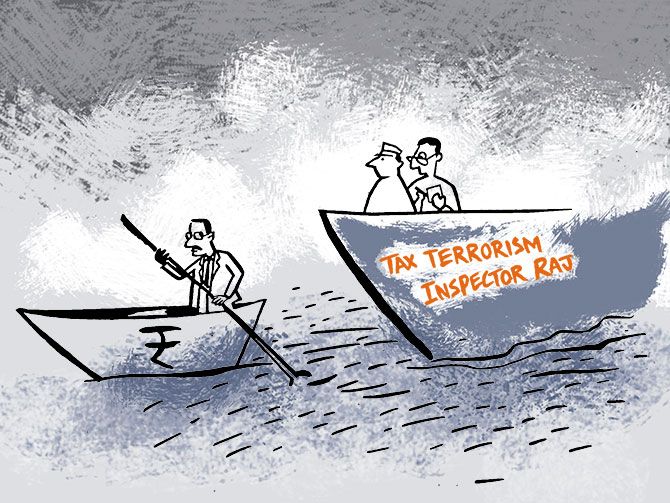'We have free-trade agreements with countries, from where goods can come into our country at zero duty.'
'In such a scenario, we have to have attractive rates to attract companies to set up businesses here, and manufacture here, instead of relying completely on goods manufactured somewhere outside and then imported.'
'The finance minister’s announcement on tax cuts will make India a low tax destination, and bring in a culture of compliance.'
Illustration: Dominic Xavier/Rediff.com

Amid debate over the possibility of widening fiscal deficit because of the reduction in the corporation tax rates, announced recently by Finance Minister Nirmala Sitharaman, Revenue Secretary A B Pandey, bottom, tells Indivjal Dhasmana that the crucial parameter is whether the deficit number reflects disciplined fiscal behaviour of the central government.
This is what, he says, investors and the markets will be looking at. Edited excerpts:
Why did the finance ministry decide to go for such an extensive step of steep corporation tax rate cuts?
It is the time we understood that in a country of 1.3 billion people, we cannot keep our eyes shut to what is happening at the global level.
The whole world has gone to a lower corporation tax regime over the last 10-15 years.
So as a policy, we, too, cannot have very high corporation tax rates.
Also, our neighbours and others have reduced tax rates.
We have free-trade agreements with countries, from where goods can come into our country at zero duty.
In such a scenario, we have to have attractive rates to attract companies to set up businesses here, and manufacture here, instead of relying completely on goods manufactured somewhere outside and then imported.
The finance minister’s announcement on tax cuts will make India a low tax destination, and bring in a culture of compliance.
Will low taxes automatically lead to high compliance?
If you lower the tax rate, the risks of being non-compliant and rewards of being compliant are both high.
At the same time, we are also strengthening the compliance structure using today’s technology.
We are linking Aadhaar with PAN, and with GST registration.
We are collecting information from various sources, doing information sharing between the Goods and Services Tax Network and the Income Tax department, and between banks and the tax authorities; we are using data analytics.
These are non-obtrusive ways of increasing compliance.
India has been a high tax country for quite some time. The rate reduction could have been announced in the Budget as well. Why now?
There is always an appropriate time for doing things.
The time had come (for the corporation tax cut).
You have brought down the corporation tax rates. Would a similar measure be taken regarding Goods and Services Tax (GST) rates?
These are not comparable to each other. One has to analyse.
What are the revenue requirements of the Centre and states, and what are the rates available, fiscal impacts, and so on?
The government has to collect minimum taxes and also ensure that people are not burdened.
In the GST Council, these things are always discussed in detail and depth.
 Also, we have to see our commitment towards the expenditure side and have to take states onboard.
Also, we have to see our commitment towards the expenditure side and have to take states onboard.
Decisions are taken in the Council with consensus.
For example, we have lowered tax rates for hotel tariffs, outdoor catering, job works, and many other items recently.
But the items which saw GST rate reduction were all small, whereas the main demand was for automobiles...
Please look at the reduction in the GST rates in the last two years.
Already reductions to the tune of Rs 1 trillion per year have been made.
It is not that every GST Council meeting would announce major rate cuts, which may put fiscal prudence in jeopardy.
Also, the recent corporation tax rate cut is across the board, which includes automobile companies.
From where will you get Rs 1.45 trillion, which is a hit to the exchequer, particularly this year when direct and indirect tax collections have been growing at a muted pace?
The finance minister has already said the government will look at the numbers and reconcile.
There can always be efficiency gains on the expenditure and revenue collections.
We have our commitment to the expenditure. We cannot go back on it.
However, there is a scope to make efficiency gains on the expenditure side without reducing our essential outlays.
At the same, there shall be efficiency gains in revenue collections by plugging evasions and leakages through the use of technology.
Are you confident of meeting the tax revenue target projected in the Budget for this year?
We are committed to fiscal discipline, and we cannot deviate from it.
Does this mean you are committing to fiscal deficit at 3.3 per cent of GDP for FY20?
Whatever number we arrive at, we have to look at whether it reflects our disciplined fiscal behaviour and that is what investors will be looking at, and that is what the market will be looking at.
Investors will see India’s economic strengths, including a competitive labour market and a highly favourable tax structure.
You have reduced the corporation tax rates but not surcharges and cess. Don’t you think it is lopsided against states which will get less devolution?
We have reduced surcharges as well.
Surcharge at the highest slab was up to 12 per cent, but now it is around 10 per cent.
Also, India is one country. The Centre and states are partners in the development. Where would new investments come in? They will all come to states.
Critics say you have taken supply-side measures all along, but the economy is facing suppressed demand. Where are demand boosting measures?
I don’t think these are only supply-side measures.
This is so because we are promoting investments.
Greater investments will bring in more jobs and higher salaries, which will increase consumption and demand.
One of the reasons for economic growth plunging to over six-year low of 5 per cent during the first quarter of FY20 is that private investments remained lacklustre. How far the tax cut will revive these investments?
Of course, private investments will revive.
We have announced a 15 per cent tax rate for new manufacturing units.
What makes you think they (investments) would not come?
We have also given a 22 per cent tax rate to others. Why will they not expand their businesses?
Have you made any estimation as to how much will the GDP growth rate increase due to these measures, say, in the remaining second half of FY20?
These measures will improve the confidence of Indian investors and also foreign investors... Once investments start flowing in, naturally it will help our economic growth story.












 © 2025
© 2025